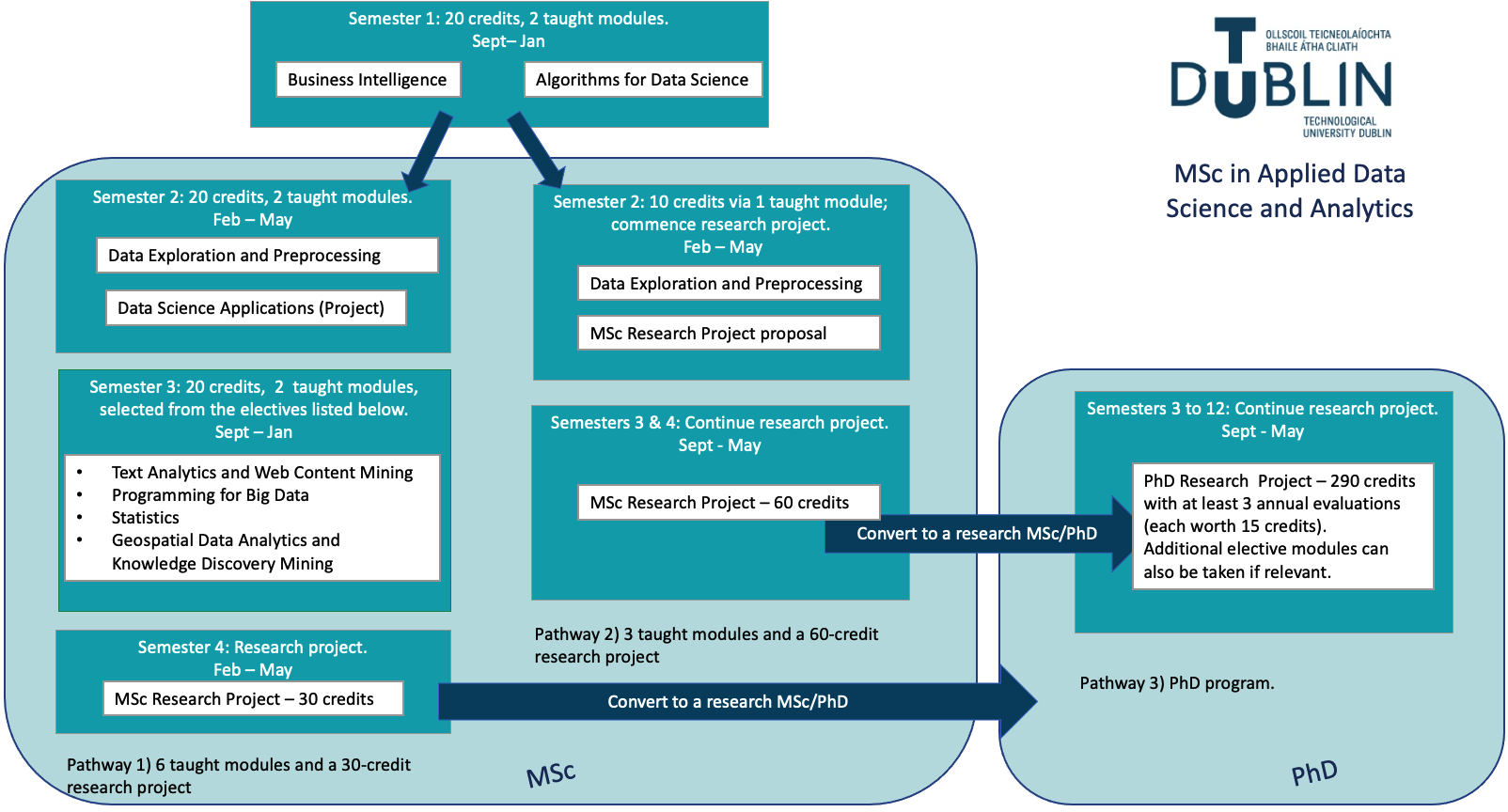MSc Applied Data Science and Analytics
TU Dublin’s MSc in Applied Data Science and Analytics was Europe’s first online masters in data science at its launch in 2010. Since then, it has gained a significant reputation as a high quality, challenging and very rewording programme with a practical focus relevant to industry contexts. The immersive and transformative 2-year online, part-time, MSc is designed to accelerate your career in data science while fitting with a busy schedule. The programme’s modules amalgamate around a robust data science methodology, allowing integrated coursework that emphasises both mathematically rigour, and data science models that generate actionable insights. It is ideal for individuals working with, or with access to, data in a real context that allows project work to bring relevance to their day job. Key points:
- Designed for professionals on a data science career path
- High completion rates
- One to one supervision in first year and second year of the programme
- International network of students
- Alumni network of senior data science professionals
- High quality course work commensurate with peer reviewed publications
The programme has attracted cohorts of students that are highly motivated and work to a high standard. It was shortlisted for Grad Ireland’s Post Grad of the Year awards a number of times. Enrolment numbers are kept small to maintain the quality of the course. While 83% of our graduates live in Ireland, we have had graduates complete the MSc from Canada, Germany, Greece, India, Malta, Netherlands, South Africa, Thailand, UK, USA and Zimbabwe. The average age of participants is 38, evidencing a teaching practice and delivery mode that successfully targets continuing education and lifelong learning.
Graduates have been hired as data scientists across a variety of industry sectors and companies including: Ericsson, IBM, Microsoft, PayPal, Intel, O2, Vodafone, Aer Lingus, Ryanair, Emirate Airlines, Dublin Airport Authority, GlaxoSmithKline, Mallon Technologies, Bank of Scotland, Arvato Finance Solutions, Sky Ireland, Eir, VHI Healthcare, United Healthcare Group, Accenture, SAP, FBD Insurance, Deutsche Bank, Ulster Bank, IBM and many others. Those working in the public sector included employees with MABS, GMS Payments Board, Dun Laoghaire – Rathdown Public Library Service, Dublin City Council, Intelligent Transport Systems, Higher Education Institutions and An Garda Síochána.
Course aims: The course focuses on the knowledge and skills to select, apply and evaluate data science and big data analytics techniques to discover knowledge that can add value to a company. Students will gain both an in-depth theoretical understanding and practical hands-on experience, including implementing novel and emerging techniques. Participants will be kept abreast of current research and state of the art in data science related topics. Details of the modules are given below.
You can listen to a video about the course here (5 mins). Up to date information on fees and applications can be found on the TU Dublin course page here.
| Core Modules | ||
| Semester 1 | Business Intelligence
BI architecture, BI front-end, Data privacy and ethics; Business Intelligence and Data Mining methodologies, and the Business Intelligence life cycle. |
Data Science Algorithms
Standard Data Mining algorithms for descriptive modeling, classification, clustering, prediction, sequence analysis and association analysis. |
| Semester 2 | Data Pre-Processing and Exploration
Data visualisation; Descriptive Statistics; Data Cleaning; Transforming data in preparation for data mining; |
Data Science Applications
Project module: Complete a data science project to meet a business objective. |
| Additional Electives, students can select two electives: | ||
| Semester 3 | Text Analysis and Web Content Mining
Natural Language Processing techniques to extract data from unstructured text. Mining data from unstructured text. |
Geospatial Data Mining and Knowledge Discovery
Data Mining techniques and algorithms for mining data from Geographic Information Systems. |
| Programming for Big Data
The algorithms and challenges for processing large datasets; students will need fundamental knowledge and skills in computer programming. |
Statistics
The learner will cover the fundamental ideas of probability and descriptive statistics, moving on to hypothesis testing and the design of experiments |
|
| Dissertation: | ||
| Semester 4 | Research Project which can be industry based | |
The two year programme is delivered over four semesters. There are two pathways as illustrated below. Semester 1 is the same for both pathways, so you decide on your pathway at the end of semester 1. There is also an option to progress to our research register to complete a PhD.
Pathway 1: Complete six taught modules and a one-semester, 30-credit research project.
Pathway 2: Complete three core taught modules and a full-year 60-credit research project.
Module syllabi can be found here.

